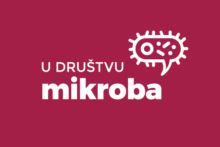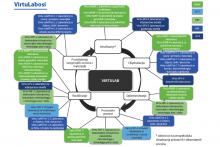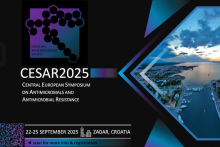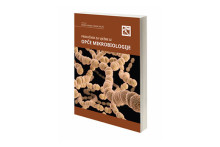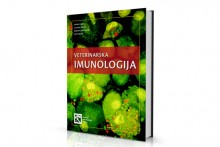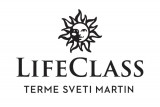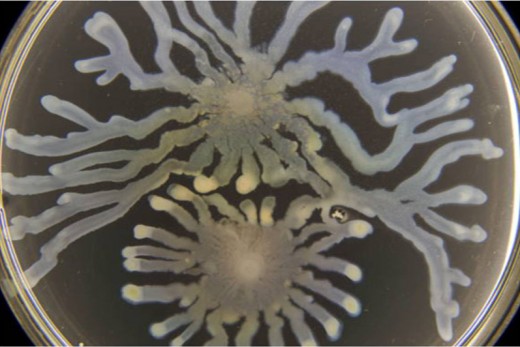
Fighting bacteria’s strength in numbers
Scientists at The University of Nottingham have opened the way for more accurate research into new ways to fight dangerous bacterial infections by proving a long-held theory about how bacteria communicate with each other.
Researchers in the University’s School of Molecular Medical Sciences have shown for the first time that the effectiveness of the bacteria’s communication method, a process called ‘quorum sensing’, directly depends on the density of the bacterial population. This work will help inform wider research into how to stop bacteria talking to each other with the aim of switching off their toxin production.
As some pathogenic organisms are increasingly resistant to traditional antibiotics, medical researchers around the world, including scientists at The University of Nottingham, are trying to find other ways of fighting infection. This new work involves using ‘quorum quenching’ compounds which interfere with bacterial signalling and disrupt their social lives.
Breaking up the party
Quorum sensing (QS) is the process by which bacteria communicate and co-operate using signal molecules which control, among other things, the production of toxins. QS is therefore an important factor in a number of bacterial species that cause serious infection in humans including Pseudomonas aeruginosa, a leading cause of death among cystic fibrosis sufferers, and MRSA which is a huge clinical problem in hospitals.
Leading the research at Nottingham, Dr Stephen Diggle said: “The fundamental assumption used to explain QS, is that the production of QS-controlled factors is not beneficial until a sufficient density of cells (a quorum) is present, and that the purpose of QS is to stimulate social behaviours only when high enough bacterial population densities are reached. For a pathogen this makes sense. Why produce toxins when there are not many cells around? Why not wait until a large number are present and coordinate production of toxin on mass which helps to overwhelm a host? This density assumption, upon which the entire QS field is based, has never been experimentally tested until now.”
Sharing the science
This ground-breaking research has just been published in the leading international journal, Proceedings of the National Academy of Sciences.
It shows for the first time that cell density is an important factor in regulating QS in the opportunistic pathogen Pseudomonas aeruginosa. Using a combination of special growth media and molecular techniques, the work has shown that QS signalling occurs in low populations of cells but that there is no benefit to the bacteria of doing so. QS is therefore most useful to the bacteria at high cell densities.
A challenge for researchers in the future is to study this in more natural environments such as infections. Bacteria such as P. aeruginosa use QS to control toxin production and this new research helps to explain how certain infections can suddenly turn life threatening due to massive toxin release. This suggests that carefully controlling bacterial population density within infections could be helpful in avoiding toxin-related damage.
Source: http://www.nottingham.ac.uk/news/pressreleases/2012/may/fighting-bacterias-strength-in-numbers.aspx
Mogućnosti zapošljavanja
National Institute of Biology Announces Fully Funded PhD Position in Viromics
Rok za prijavu: 06.06.2025
Projekt "U Društvu mikroba"
Osnovna svrha projekta je doprinijeti uvođenju, razvoju i održivosti programa društveno korisnog učenja na fakultetima. Više o projektu
Zanimljivosti
Projekt Virtulab
VIRTULAB je virtualno umrežen znanstveno-istraživački laboratorij za primarne i sekundarne sirovine.Naša članica, prof. dr. sc. Dijana Škorić u podkistu o koronavirusu i cjepivu
Podkist je podcast Zavoda za komunikacijske i svemirske tehnologije (ZKIST) u kojem se razgovara o znanstvenim i tehnološkim temama te temama povezanim sa studiranjem i učenjem. Cilj je u opuštenoj atmosferi približiti najnovija znanstvena istraživanja široj publici, dati studentima širi pogled na to što uče te poslušati savjete starijih kolega o studiranju, radu i napredovanju u profesionalnoj karijeri.Postani član HMD-a
Cilj Društva je okupljanje mikrobiologa i stručnjaka srodnih struka s ciljem unapređenja svih grana mikrobiologije.
Skupovi HMD-a
7th Central European Symposium on Antimicrobials and Antimicrobial Resistance (CESAR2025)
Date: 22 - 25 September 2025
Venue: Zadar, Croatia
The 7th Central European Symposium on Antimicrobials and Antimicrobial Resistance (CESAR2025) will be held from September 22-25, 2025, at the Hotel Kolovare in Zadar, Croatia. This attractive tourist city, located in the center of the East Adriatic, is surrounded by stunning natural landscapes, making it an ideal venue for this important event.Ostali skupovi
Date: 4-6 November, 2026
Venue: Lisbon, Portugal
7th Croatian Congress of Toxicology with International Participation
Date: October 5-8, 2025
Venue: Rab, Croatia
12th Trends in Medical Mycology
Date: 19-22 September 2025
Venue: Bilbao, Spain
Izdavaštvo
Priručnik za vježbe iz opće mikrobiologije
Ovaj sveučilišni priručnik napisalo je petnaestak autora iz desetak visokoškolskih ustanova iz Zagreba i Rijeke, a sadržaj je podijeljen u petnaest, slikama bogato ilustriranih poglavlja u kojima su opisane i obrađene različite bakteriološke, virološke, mikološke, imunološke i molekularno-biološke metode koje se upotrebljavaju u općoj mikrobiologiji koja se studira na nizu različitih fakulteta i visokih škola.
Veterinarska imunologija
Radi se o vrhunskoj literaturi za potrebe visokoškolske nastave iz veterinarske imunologije. Knjiga je svojim sadržajem namijenjena prvenstveno studentima, ali i veterinarima u praksi i nastavnicima.
(Iz recenzije)


